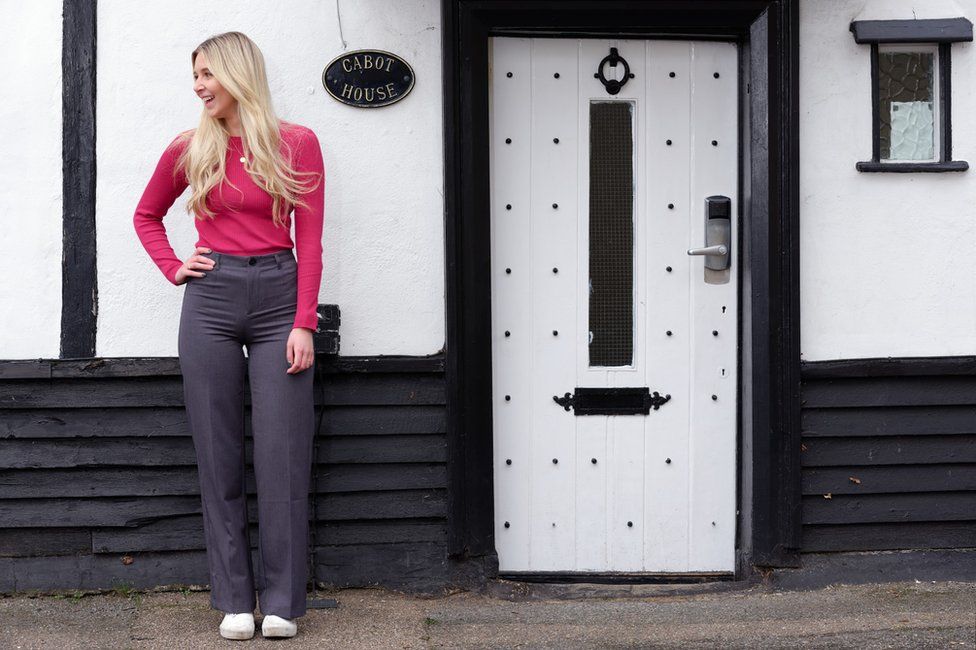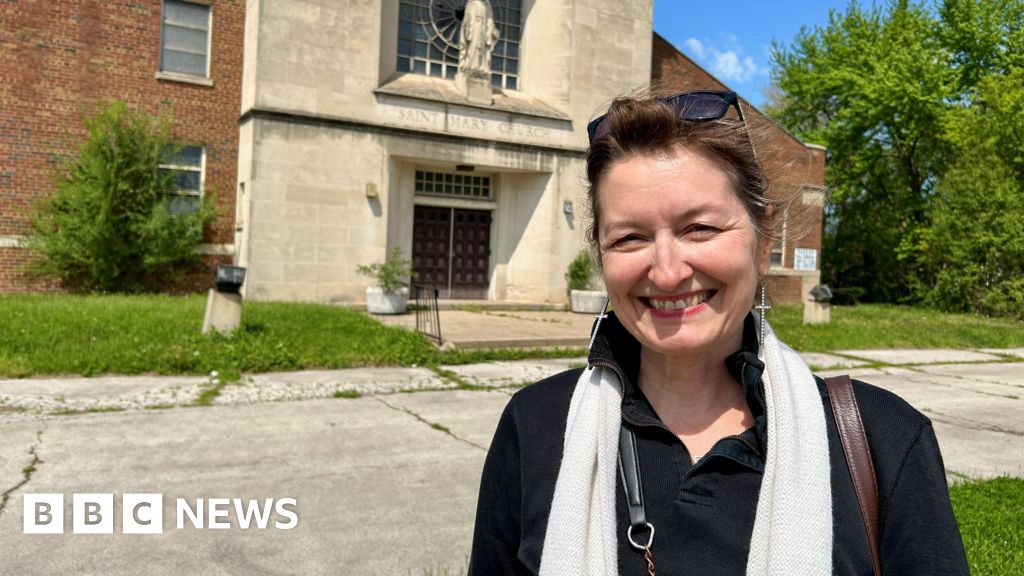ARTICLE AD BOX

Alyssa Griffiths, 25, from Torbay in Newfoundland came to Harlow after hearing from other students about their experiences at Memorial's Essex outpost
By Laurence Cawley
BBC News, Essex
Blink, and you might well miss something a little unusual about the quaint, almost village-like, centre of Old Harlow in Essex. Here, amongst a scattering of businesses, a church and a community centre, sits a campus belonging not to a British university but a Canadian one headquartered 2,327 miles (3,745 km) away. How and why did it end up here?
"I really like Harlow," says Alyssa Griffiths, a 25-year-old from Torbay in Newfoundland, Canada.
An education student, she describes the town as "homey" and "a lot like Newfoundland" because the "weather is very similar".
Despite being an ocean away from home, Ms Griffiths is still on the grounds of her university - Memorial University of Newfoundland.
She has merely swapped university campuses - from St John's, in Newfoundland, for Harlow, in England.
The campus, which has 16 staff and up to 60 students at any one time, was the brainchild of Lord Taylor of Harlow who, after helping create the new town of Harlow after World War Two, became president of Memorial on the other side of the Atlantic.
Speaking at the time, Lord Taylor said: "I think it would be rather fitting if the oldest town in the New World is linked to the newest town in the Old World."
Ms Griffiths says she and many other students knew nothing of their university's Harlow outpost
The campus has steadily grown since 1969 to include a 150-year-old Maltings building, a Victorian former schoolhouse, a former butcher's shop and an upstairs apartment in Market Street and the oak-beamed Cabot House.
Memorial is not the only Canadian institution with a UK campus. Since1993, Queen's University in Ontario has run its Bader College campus from Herstmonceux Castle in East Sussex.
Students from Memorial come to Harlow to continue their studies in a range of fields including teaching, business, biochemistry, biology, the visual arts, theatre and the social sciences
"I personally didn't know about it until I heard about it from one of the girls who ended up coming over with me," says Ms Griffiths.
"Everyone I spoke to who had done this programme said it was amazing and life-changing and I would completely agree with them.
"I'll be trying to spread the word when I go home."
Jayme Humber and Alyssa Griffiths discuss their experiences of studying and working in Harlow
For students like Ms Griffiths, spending the Canadian Thanksgiving - held on the second Monday of October - away from home and family can be tough.
However, a local head teacher - herself a former student at Memorial - invited the current students over for a traditional Jiggs Dinner (which is like a roast dinner, but boiled).
Jayme Humber, 23, from Corner Brook in Newfoundland, is currently teaching reception-aged children at a primary school in Harlow.
"It is really good," she says. "It is really nice to see the English school system and compare it to Canada and Harlow is a great place to travel from."
At weekends, Jayme Humber, 23, from Corner Brook in Newfoundland, has used her Harlow base to travel extensively around Europe
In the first three months of her semester in Essex, she has used her Harlow base to travel widely.
"We've been to a lot of countries on the weekends such as France, Holland, Ireland, Greece and we're about go to Spain."
Years from now, both Ms Humber and Ms Griffiths are likely to be remembered by their pupils as that "Canadian teacher" they had when they were young.
Clocks on the Harlow campus show both the local time and the time in St John's, Newfoundland
Harlow resident Michelle Sortwell was born in the year Memorial's Harlow campus first opened and had a "Canadian teacher" at primary school.
But while Ms Sortwell remembers the teacher being "really good" she no longer remembers her name.
It was only after Ms Sortwell became the finance manager at the campus that she realised her Canadian teacher must have been a student at the institution which now pays her salary
It was only after Ms Sortwell became the campus's finance manager that she realised her Canadian teacher must have been a student at the institution which now pays her salary.
"I am desperately trying to find her," she says. "It would be really nice to track her down and tell her where I am working now."
She loves working at Memorial but says some things took a while to get used to.
"They say 'right' a lot at the end of their sentences and that threw me a little bit because I didn't know if I was meant to respond to the 'right' or is it just an end of a sentence?"
Such confusion, she says, is mutual.
"When our students arrive they get really confused when people say 'alright' and they look back and say 'yeah, I'm alright, why?'.
"We do like to teach our students some Essex-isms - such as 'geezer' (as opposed to geysers) and 'chav' - and they love learning what our sayings are."
To date, Ms Sortwell has managed to avoid partaking in the Screech-In ceremony which, she says involves imbibing screech (a Newfoundland rum) before kissing a cod.
Once done, the cod-kissing rum drinker is declared "an honorary Newfoundlander".
Publicans George and Hayley Reynolds say they love their Canadian patrons despite their aversion to ordering rounds of drinks and penchant for producing out-of-date bank notes
Although bereft of screech and cod, many students quickly discover The Crown public house.
"They are good customers and bring a great spirit to the place," says landlord George Reynolds.
"They try to tip as well," says Mr Reynolds. "OK, so that's nice and welcome, but we do tell them they don't need to tip in pubs and bars in the UK.
"They also come in as a group but pay individually rather than in a round which has, shall we say, in impact on our efficiency."
Cristin Casey first came here in 2005 as a student for teaching practice
Of all the people connected with the campus, this little corner of Canada arguably matters most to Cristin Casey, the campus manager.
She first came here in 2005 as a student for teaching practice
"I met a boy - a Harlow lad - and 18 years later I'm still here," she says. "This is my home away from home and literally this campus is a little bit of Newfoundland in the place I chose to live in."
She says the village feel of the campus was vital in minimising the culture shock for incoming students.
"Newfoundland is one and a half times the size of the UK with only 500,000 people and half of those people live in St John's, the big city in Newfoundland," she says.
"The shock of going into London for the first time can be immense."
She is keen that students here feel at home.
The campus recently held a smudging ceremony, a First Nations purification ceremony, which involves lighting sacred medicinal plants
To that end, the Ode to Newfoundland hangs above reception, the rooms are named after communities in Newfoundland and Labrador, the tables in the cafeteria are named after popular restaurants back home and there's a map on which new students pin a flag to show where they are from.
"We have Canada Day and Thanksgiving celebrations so we will make Newfoundland food - Jiggs Dinner - for them," says Ms Casey. "I brought moose over for moose stew and other little things from Newfoundland whenever I go home to make the students feel at home and to help the staff know a little of what Newfoundland is like."
She also hopes that, in the future, everybody in the area - and further afield - will know about this little corner of Canada.
When scaffolding is next put up on the Maltings building, she says, she plans to have four flagpoles installed.
They will fly the Newfoundland flag, the Labrador flag, the Canadian flag and the Union Flag.
"You won't be able to miss us," she says.
Photography: Laurence Cawley
Follow East of England news on Facebook, Instagram and X. Got a story? Email eastofenglandnews@bbc.co.uk or WhatsApp 0800 169 1830
The BBC is not responsible for the content of external sites.

 1 year ago
96
1 year ago
96








 English (US) ·
English (US) ·